When we walk our dogs, they often pee or poop in the park or garden. Sometimes I wonder if dog poop is good for the lawn? Is dog poop good for grass? Does dog poop kill grass? At first glance, dog poop or dog pee may seem like natural fertilizer, but it's actually more complicated than that.
This article explores the impact of dog poop on lawn health, debunks common myths, and provides practical advice for maintaining a lush, healthy lawn while sharing it with your furry friends.
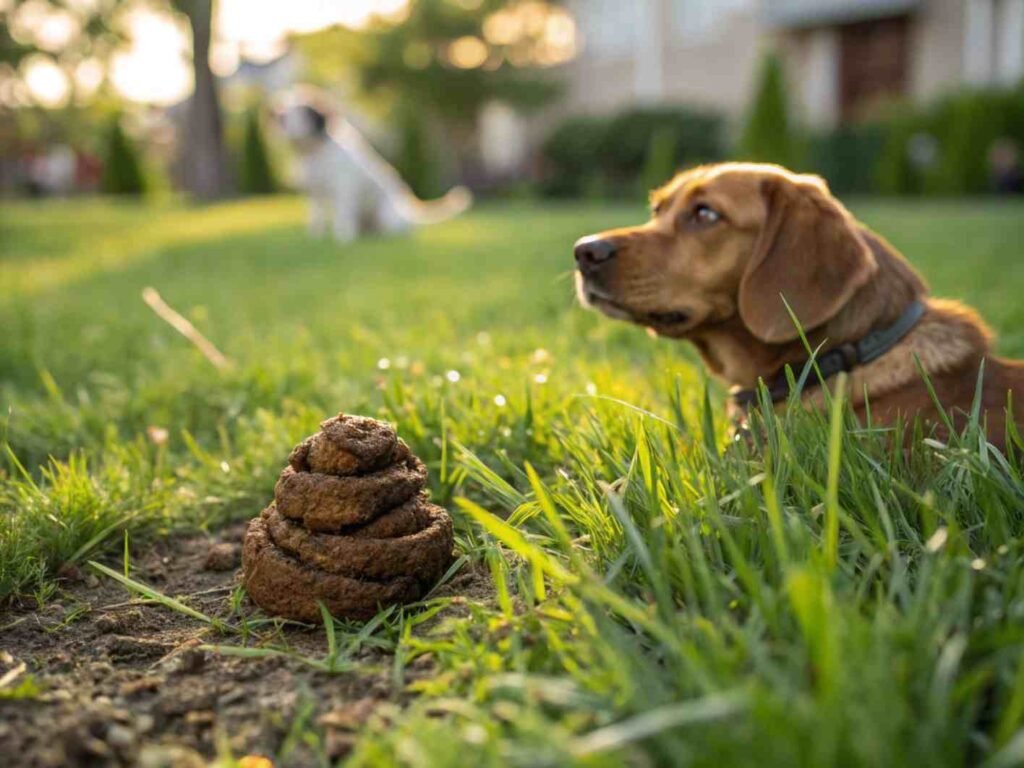
Composition of Dog Poop
Dog poop is primarily derived from a high-protein diet, which results in a high nitrogen content in its feces. Nitrogen is an essential nutrient for plant growth and a key component of many fertilizers. The nitrogen content in dog poop is high and unbalanced.
Unlike herbivore feces, which contain a balanced nutrient composition, dog poop is acidic and lacks essential elements such as phosphorus and potassium that grass needs for healthy growth.
Why Dog Poop Decompose on Grass
The high nitrogen concentration in dog poop initially stimulates grass growth, making the grass patches look unusually tall and dark green. But as the feces fully decompose, the excess nitrogen "burns" the grass, causing the affected areas to turn yellow and eventually brown. Depending on environmental conditions, this process can take weeks to months.
Nutrient Overload: Excess nitrogen and phosphorus create imbalances that weaken grass roots.
Pathogen Spread: Bacteria and parasites (Such as E. coli, Ascaris, Giardia, etc.) in feces can survive in soil, posing risks to pets and humans.
Water Contamination: Rainwater can wash dog waste into storm drains, polluting local water sources.
Aesthetic Damage: Unsightly piles and odors reduce your lawn’s appeal
Dog poop also contains harmful bacteria and parasites, such as E. coli, roundworms, Giardia, etc., which not only pose a threat to the health of humans and pets, but also contaminate soil and water sources, causing environmental pollution.
The Harm of Dog Poop to Grass
The most obvious effect of dog poop on lawns is the formation of unsightly brown patches. This is because the concentration of nitrogen in dog poop is too high for the grass to absorb safely. The damage usually occurs in three stages:
Tall, dark green grass: In this stage, the nitrogen begins to act like a fertilizer, causing the grass to grow rapidly.
Yellow patches: The excess nitrogen begins to burn the grass, making it brittle.
Brown patches: The grass dies, leaving dead patches that need to be reseeded.
Dog poop also promotes the growth of toxic fungi in lawns, which can harm pets if they ingest them. These fungi thrive in the nitrogen-rich environment created by the decomposition of feces.
Leaving dog poop on the lawn also runs the risk of spreading diseases and parasites that can infect other animals and humans, especially children playing on the grass. Rainwater can wash these pathogens into storm drains and waterways, causing greater environmental contamination.
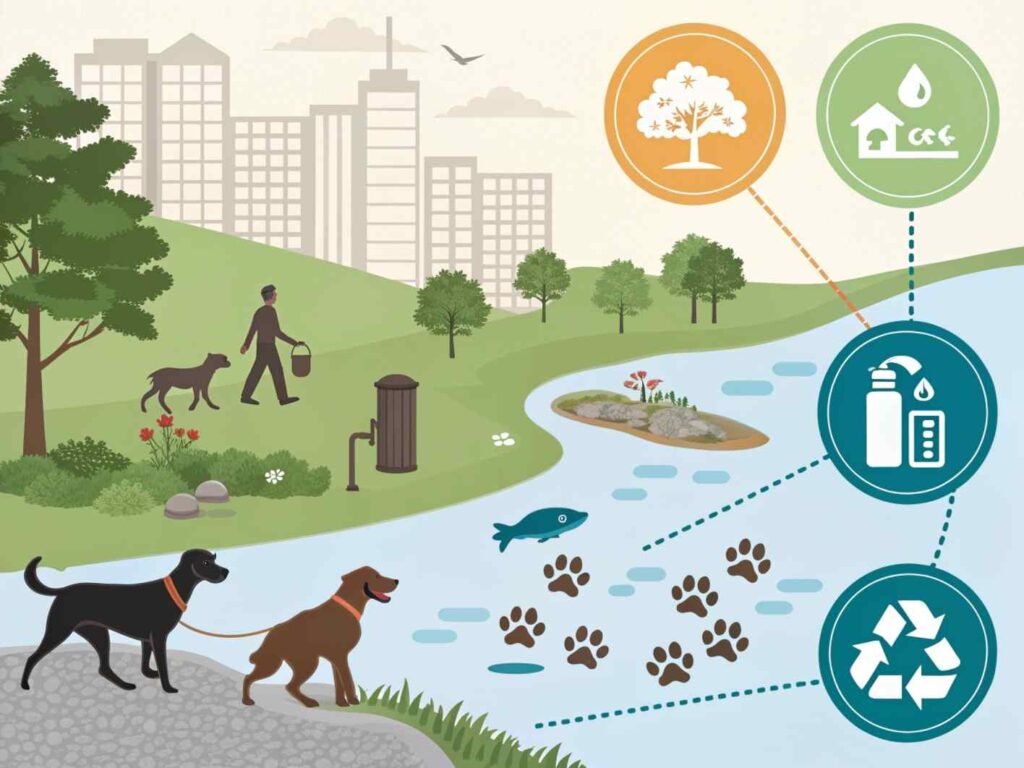
Effects of Dog Urine on Lawns
High Nitrogen Content: Urine contains concentrated nitrogen, which burns grass, leaving yellow or brown spots.
Female Dogs: Their squatting behavior concentrates urine in one spot, worsening damage compared to male dogs.
Salt Content: Salts in urine dehydrate grass, compounding the burn effect.
Urine also acidifies the soil, making it no longer suitable for grass and other plants to grow. While diluted urine may have some benefits for nitrogen, repeated application to the same area is harmful.
Can Dog Poop Ever Be Good for Grass?
While dog feces contain nutrients, they’re not readily usable by grass. Composting dog poop is possible but requires:
- A dedicated pet waste composter to kill pathogens.
- Avoiding use on edible plants due to health risks.
- Proper dilution to prevent nutrient overload.
Dog poop is not a good fertilizer for grass without extensive processing. Dog poop is not a safe or effective fertilizer unless properly composted under specific conditions.
The Impact of Dog Poop on the Environment
1. Water Pollution
Dog waste that’s left on the ground can be carried by rain into storm drains. From there, it flows into rivers, lakes, and oceans. This introduces bacteria, nitrogen, and phosphorus into waterways, which can cause algae blooms and harm marine ecosystems.
2. Public Health Hazard
In public parks or apartment lawns, uncollected dog poop poses a health risk to other pets and people. Children are especially vulnerable, as they are more likely to play in the grass and come into contact with contaminated soil.
3. Wildlife Disruption
Wild animals can come into contact with dog waste, spreading diseases or disrupting natural ecosystems. Parasites from domestic dogs can infect foxes, raccoons, or even farm animals.
How to Protect Your Lawn from Dog Poop Damage
- Prompt Cleanup: Remove dog poop as soon as possible to prevent nitrogen buildup and pathogen spread.
- Proper Disposal: Use sealed bags to dispose of waste in the trash rather than composting or leaving it on the lawn.
- Watering: After your dog urinates in one spot, watering the area can help dilute nitrogen concentration and reduce damage.
- Lawn Repair: Reseed or patch brown spots promptly to restore grass health.
- Fertilization: Use balanced lawn fertilizers to support grass recovery and growth.
- Pet Diet: Feeding your dog a balanced diet may reduce nitrogen concentration in waste.
- Professional Services: Consider pet waste removal services if cleanup is challenging.
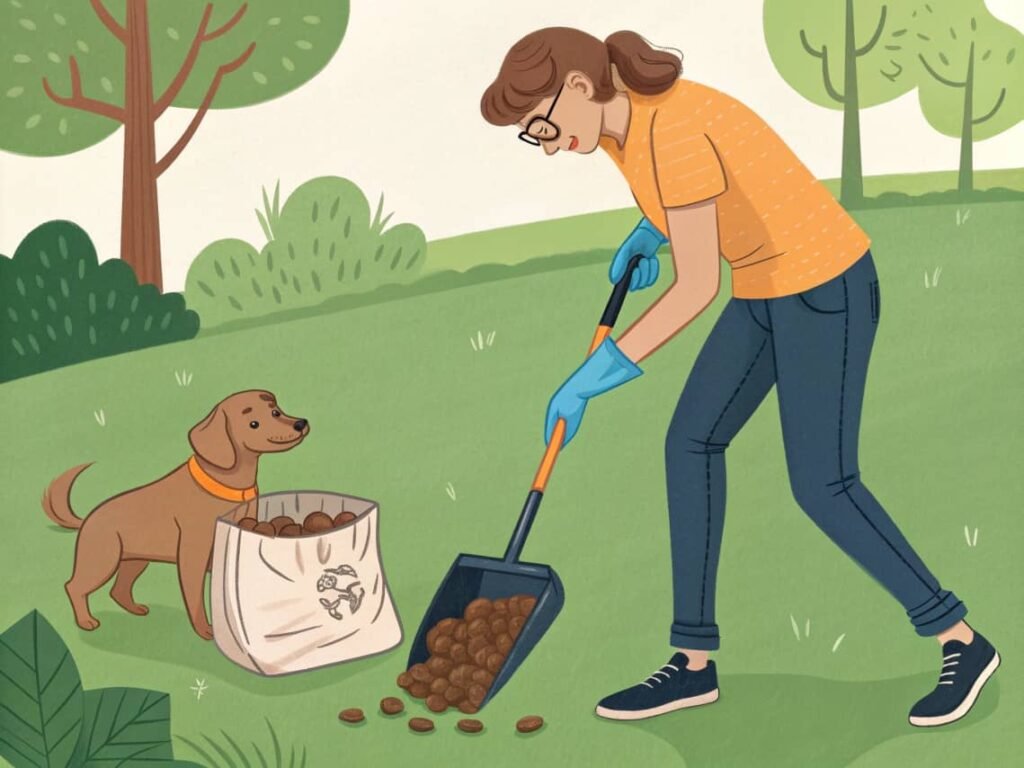
What to Do with Dog Poop in Yard
1.Pick It Up Right Away
- Don’t leave it to “break down naturally” — dog poop can take months to decompose and harms your lawn.
- Use a scooper or gloved hand and a bag.
2. Use the Right Type of Bag
- Use compostable dog poop bags made from cornstarch or other plant-based materials.
- Avoid regular plastic bags, which take decades to decompose in landfills.
3. Properly Dispose of the Bag
- Trash bin: In most areas, sealed bags (compostable or not) should go into your regular garbage unless your city has a dog waste program.
- Compost (optional): If you have a pet waste composting system, you can compost dog poop for non-edible plants only.
- Dog waste digesters: These are small in-ground systems that break down dog waste safely.
4. Avoid These Mistakes
🚫 Don’t leave it on the lawn — it kills grass and spreads bacteria.
🚫 Don’t toss it in storm drains — it pollutes waterways.
🚫 Don’t bury it near vegetable gardens — parasite risks remain in the soil.
Can You Burn Dog Poop
Technically yes, in industrial incinerators with high heat and proper filtration systems. These are sometimes used in large-scale pet waste disposal programs — but not something you'd do at home. Burning dog poop is not recommended.
1. Releases Harmful Toxins
Dog poop contains bacteria, parasites, and pathogens (like E. coli, Salmonella, and roundworms). Burning it can release toxic fumes and airborne contaminants, which are harmful to:
- Your lungs
- Nearby people or pets
- The environment
2. Smells Awful
Burning dog poop produces a foul odor that is much worse than burning leaves or wood. It’s unpleasant for you and your neighbors.
3. Illegal in Many Places
Open burning of pet waste is often against local laws or fire codes, especially in urban or suburban areas. You could face fines or penalties.
4. Doesn’t Fully Sanitize
Burning in an open fire or backyard pit likely won’t get hot enough to fully kill all the harmful bacteria or parasites. That means some contamination can still occur, especially if the ashes are spread on soil.
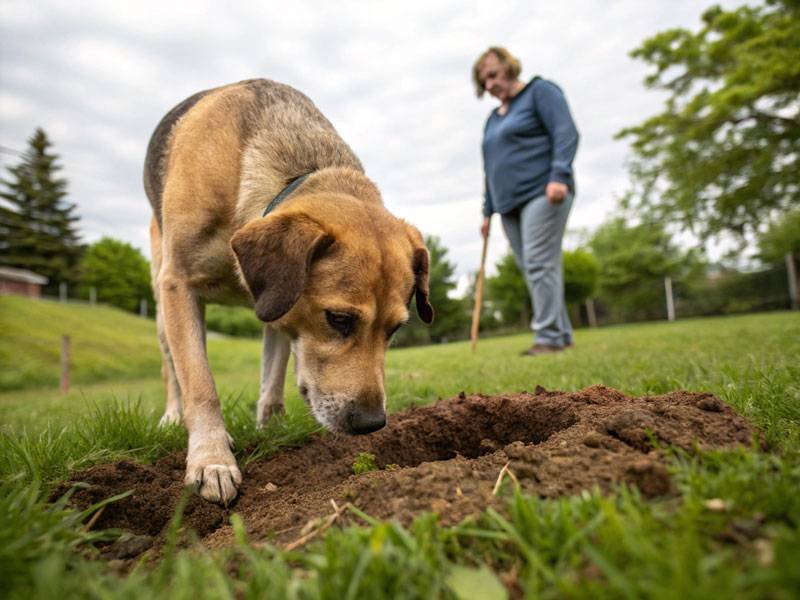
Is Dog Poop Good for Anything
While dog poop is not good for grass or as a raw fertilizer, that doesn’t mean it’s completely useless. When handled properly, dog waste can be repurposed safely and responsibly. Here are a few ways dog poop can be good for something:
Composting (under controlled conditions)
Dog poop can be composted, but only in a dedicated pet poop composting system, not a regular garden compost.
These systems reach high temperatures that kill harmful pathogens.
Compost should only be used for non-food plants, such as ornamental gardens or trees.
Never compost pet poop for food crops.
Biogas or Energy Production
Some cities and research projects are exploring ways to convert dog poop into biogas or electricity.
Methane from dog poop can be captured and used as an energy source.
This is still a niche technology, but shows promise in large dog parks or urban settings.
Soil Improvement (if done properly)
When properly composted and disinfected, dog poop may help improve soil structure—not only for growing food, but also for landscaping or decorative flower beds.
Education and Awareness
Dog poop can help raise awareness about responsible pet ownership and the importance of proper poop disposal. It can also drive demand for environmentally friendly products, such as compostable poop bags and pet waste disposal services.
Can Dog Poop Ever Be Used for Fertilizer?
Yes—but only under strict conditions.
Dog Poop Composting Systems
- Enclosed bins to prevent contamination
- High temperatures to kill pathogens
- Long composting cycles (6–12 months)
- Clear separation from food-growing areas
You can find dog waste composters for sale or build one yourself. Just remember: never use dog compost on vegetable gardens or edible plants. It’s only safe for ornamental lawns or flower beds, and even then, caution is advised.
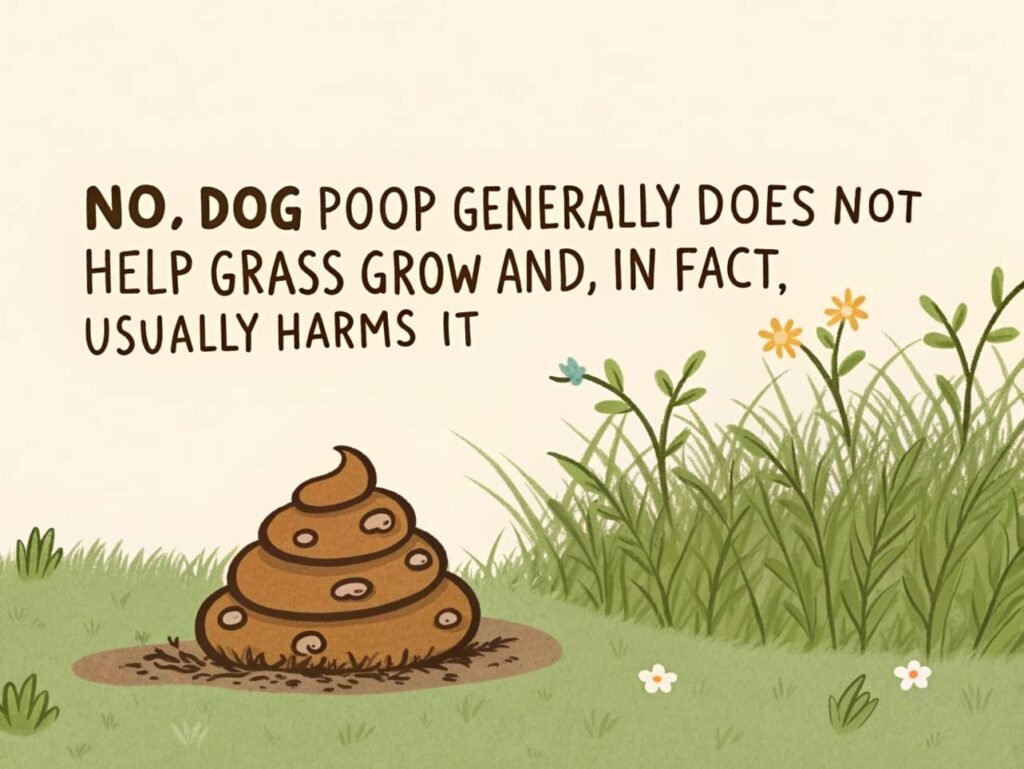
Does Dog Poop Help Grass Grow?
No, dog poop does not help grass grow effectively and can actually harm your lawn. While it contains nutrients like nitrogen and phosphorus, these are too concentrated and can cause "fertilizer burn," leading to brown or yellow patches. Additionally, dog poop harbors pathogens (e.g., E. coli, roundworms) that pose health risks and can contaminate soil. Leaving it on the lawn also smothers grass, blocking sunlight and oxygen, and attracts pests.
For healthy grass, promptly remove dog poop, dilute urine spots with water, and use balanced fertilizers. If you want to recycle dog waste, use a pet waste composter, but never apply it directly to your lawn. Choosing resilient grass types like perennial ryegrass or tall fescue can also help maintain a healthy lawn.
Conclusion
Dog poop and urine can harm your lawn if not managed, causing nutrient burn, pathogen spread, and environmental issues. By cleaning, choosing resilient grass, and maintaining your lawn, you can keep your yard healthy and attractive.
FAQs
Does Dog Feces Act as a Good Fertilizer for Lawns?
No, dog feces do not act as a good fertilizer for lawns. Unlike cow or horse manure, which come from herbivores with different digestive systems, dog waste is highly acidic and contains elevated levels of nitrogen. This high nitrogen content, along with the presence of pathogens, can actually "burn" or kill grass, leading to brown patches and an unhealthy lawn. So, if you're asking, "Does dog manure help grass grow?" the answer is no, it typically causes harm.
Can Dog Manure Improve Soil Quality or Plant Growth?
Dog manure can harm, rather than improve, soil quality and plant growth. The composition of pet waste, including its high acidity and potentially harmful bacteria (like E. coli and Salmonella) and parasites (such as roundworms and hookworms), can disrupt the soil's natural balance. These elements don't enrich the soil; instead, they can deplete beneficial microbes and make the soil less hospitable for healthy grass and plants. Therefore, dog droppings are not beneficial for cultivating a thriving garden or lawn.
Why Does Dog Poop Kill Grass and Create Brown Spots?
Dog poop kills grass and creates brown spots primarily due to its high nitrogen content. This phenomenon is similar to "nitrogen burn" you might see from over-fertilization. The concentrated nitrogen released from the decomposing waste is too much for the grass to absorb, leading to dehydration and cell damage in the grass blades. The acidic nature of the waste also contributes to this damaging effect, making the soil around the dog excrement toxic to the turf, causing those unsightly patches of dead grass.
Is Pet Waste Beneficial for Gardens or Composting?
Pet waste is generally not beneficial for gardens or typical composting, and it can even be dangerous. Due to the presence of harmful bacteria, parasites, and potential viruses, using dog waste in gardens where food is grown or in home compost piles can spread disease. While specialized, high-temperature composting systems can process dog droppings safely, it's not recommended for standard backyard composting. It's always best to dispose of dog waste properly and hygienically to protect both your garden and public health, avoiding the environmental impacts of neglecting cleanup.
What are the Environmental Impacts of Not Picking Up Dog Poop?
Not picking up dog poop has significant negative environmental impacts. Beyond being unsightly and smelling bad, uncollected dog waste contributes to water pollution. Rain can wash harmful bacteria and parasites from the feces into storm drains and ultimately into rivers, lakes, and oceans, contaminating water sources and harming aquatic life. Furthermore, the decomposition of dog waste releases greenhouse gases, contributing to air pollution. Properly disposing of dog droppings, and understanding the dog poop decomposition time, helps protect local ecosystems and public health, reducing the need for grass repair after dog damage.
Can Dog Poop Be Used as Fertilizer?
Only if it's composted safely in a dedicated system designed to neutralize pathogens. Never use fresh dog poop as fertilizer directly on your lawn or garden, as it carries risks of soil contamination and can lead to dog poop nitrogen burn.
How Long Does Dog Poop Take to Decompose?
Dog poop decomposition time can vary, but it typically takes 9–12 months, depending on weather conditions. During that entire period, it continues to pollute the soil and poses a health risk, emphasizing the importance of picking up dog poop promptly.





